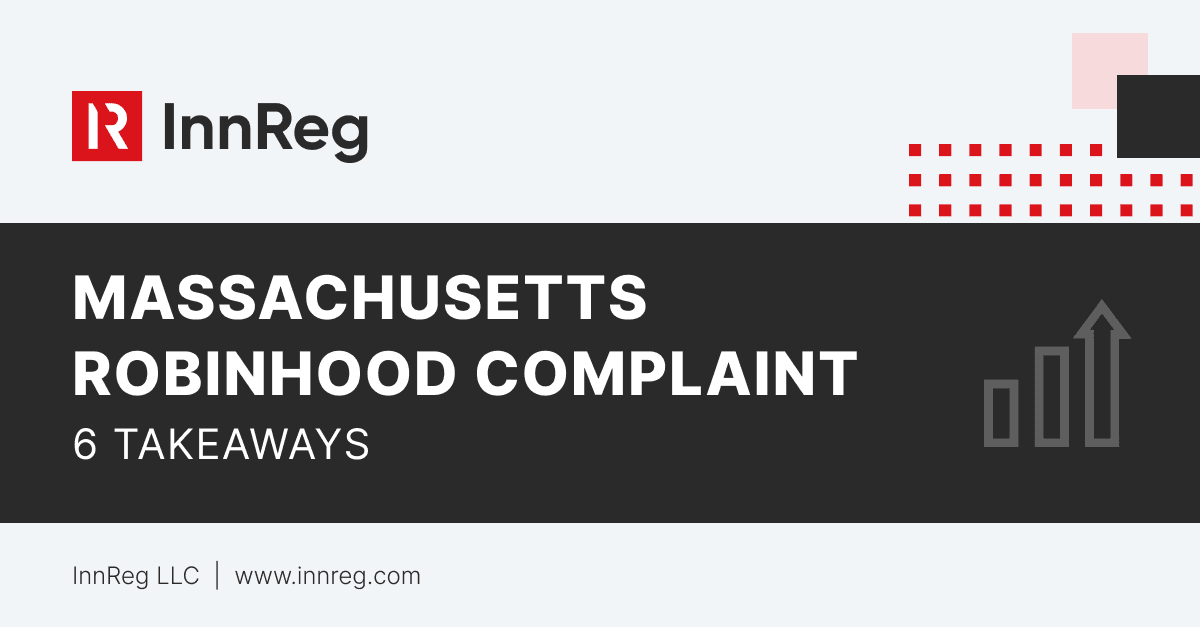Contents
The Massachusetts Securities Division filed an administrative complaint against the trading app Robinhood for breach of the Massachusetts securities rules and regulations on December 16, 2020.
Massachusetts claims that the respondent:
Targeted younger individuals with little to no investment experience,
Did not implement proper procedures to deal with outages or disruptions in service,
Provided recommended stocks without analyzing whether the stock was appropriate for the investor,
Used gaming tactics to encourage customers to frequently interact with the app,
Failed to properly supervise review and approval of options trading for customers,
Breached the new Massachusetts fiduciary duty rules.
While none of these allegations have been proven when this analysis was written, there are six critical takeaways from Robinhood's complaint to implement in your broker-dealer business operating in Massachusetts to ensure your business complies with the Commonwealth Securities Division rules.
See also:

InnReg is a global regulatory compliance and operations consulting team serving financial services companies since 2013. If you need assistance with compliance or fintech regulations, click here.
1) Robinhood Advertising Claim
Do not advertise in a way that specifically targets younger inexperienced individuals.
It is stated that Robinhood advertising specifically targeted young financially unstable people and encouraged them to invest and implied in their advertising they would teach consumers about investments along the way.
2) Robinhood Outage Allegation
Invest in sufficient infrastructure and policies to deal with outages or any disruptions of your service for consumers.
The complaint alleges that the respondent did not have proper policies and procedures, and infrastructure to deal with outages and/or disruptions in their service. From January 1, 2020, through November 30, 2020, the site and app experienced an estimated 70 outages.
Uptime is critically important in stock trading as prices can fluctuate by significant amounts in a day. In particular, the complaint highlights the outage between March 2, 2020, and March 3, 2020. The customers were unable to make trades even as the stock market gained a historic 1,290 points.
While the company experienced rapid growth, it failed to develop infrastructure to prevent or minimize these outages. Reoccurring Robinhood outages often resulted in customers being unable to contact the platform’s customer support either by email or phone.
3) Robinhood Stock Picks Claim
Do not provide lists of recommended stocks without first analyzing whether the stock is appropriate for the investor.
Massachusetts alleges that the company provided a list of recommended stocks in which consumers could trade without analyzing the suitability of the stocks for its customers, many of whom had no previous experience in investing.
4) Robinhood Gaming Allegation
Do not use gaming techniques such as daily incentives to encourage consumers to interact more frequently with your investment application.
The complaint alleges that the company used daily incentives to get their customers to interact continuously and repeatedly with the application using free offers of stocks like Microsoft, Visa, and Apple.
The complaint also alleges that the respondent used offers such as $500 in stocks or recommending the app to others to facilitate frequent, risky, and unsuitable options trading by inexperienced customers.
5) Robinhood Option Trading Review Claim
You must review and approve the options trades being made by customers.
Although Massachusetts does allow the use of an automated system for reviewing option trading, it alleges that the company did not engage in the required manual spot check. As a result, at least 680 unqualified individuals in Massachusetts were allowed to make options trades.
6) Fiduciary Responsibilities Breach Allegation
Broker dealers must comply with the Massachusetts fiduciary duty rules for broker dealers that came into effect on September 1, 2020.
These rules require that a broker dealer disclose all material facts to a customer, take all practical measures to avoid conflicts of interest, to mitigate those that cannot reasonably be avoided, and to make recommendations and provide investment advice without regard for the interests of anyone other than the customer.
The complaint filed by the Massachusetts Securities Division claims that the respondent breached these fiduciary duties in their dealings with customers in Massachusetts.
Robinhood Complaint Analysis: The Bottom Line
High-profile news stories about regulatory issues, cybersecurity, data protection, and more have one thing in common—they demonstrate the increasing likelihood of scrutiny across the board. It is relatively easy to say in hindsight what went wrong. However, it is also not particularly difficult to anticipate and mitigate risk.
In this specific case, making trading functionality available to inexperienced investors comes with known risks that a rigorous compliance program can identify and manage. Reaching a large user base raises high availability expectations at peak times, even more so when that uptime becomes an essential feature.
As the above takeaways suggest, addressing these risks is not trivial even when it comes to major players like Robinhood. It takes deep expertise tailored to the specifics of a financial innovator’s business model and user base to foresee how existing regulations would apply to an innovative business model and operationalize compliance accordingly.
How Can InnReg Help?
InnReg is a global regulatory compliance and operations consulting team serving financial services companies since 2013.
We are especially effective at launching and scaling fintechs with innovative compliance strategies and delivering cost-effective managed services, assisted by proprietary regtech solutions.
If you need help with broker-dealer compliance, reach out to our regulatory experts today:
Published on May 14, 2021
Last updated on Dec 2, 2023
Related Articles
Latest LinkedIn Posts













